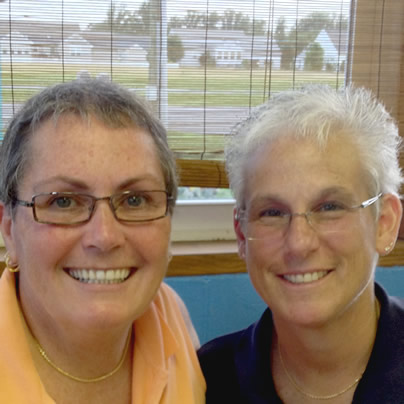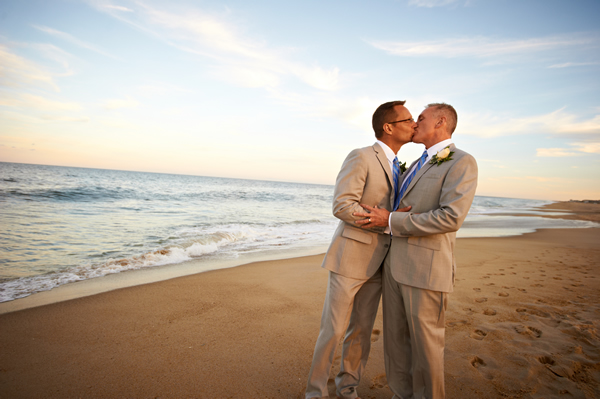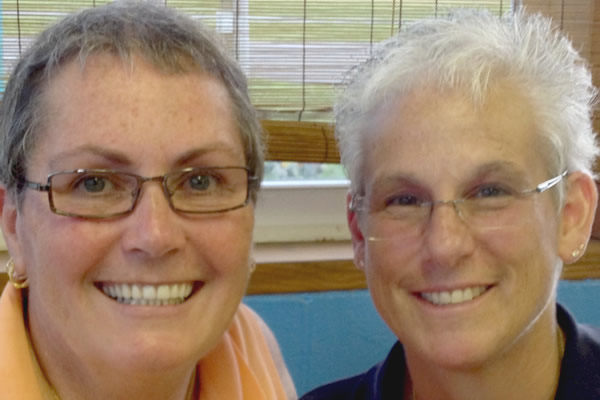Local
Gay couples: Delaware marriage law brings recognition, equality
Same-sex nuptials to begin on Monday


Rehoboth Beach residents Chris Beagle and Eric Engelhart, owners of event planning company Flair!, on the beach last September following their civil union. (Photo courtesy of the couple)
“It’s the end of a journey; it’s the culmination,” Beagle, who also co-owns a wedding planning company with Engelhart, told the Washington Blade. “It’s the end of a journey. It’s the culmination. It’s what we need to do to complete this process of legal recognition.”
Beagle and Engelhart are among the first gay and lesbian couples who will take advantage of Delaware’s same-sex marriage law that takes effect on Monday.
State Sen. Karen Peterson (D-Stanton,) who came out in May during the debate over the same-sex marriage bill that Gov. Jack Markell signed into law, and her partner, Vikki Bandy, will become the first legally married gay couple in Delaware when they convert their civil union into a marriage at the New Castle County Clerk of the Peace’s office in Wilmington.
“We have been together for almost 25 years, and I never thought we would live to see the day when we could be married in our home state,” Peterson told the Blade last week.
The Sussex County Clerk of the Peace in Georgetown will begin to issue marriage licenses to same-sex couples at 8 a.m. on Monday, with doors opening at 7 a.m. The Kent County Clerk of the Peace in Dover will open at 8 a.m.
Sussex County Clerk of the Peace John Brady, who is gay, will officiate Beagle and Engelhart’s ceremony at CAMP Rehoboth at 10 a.m. Joseph Daigle, II, and Daniel Cole will become the first same-sex couple who had not previously entered into a civil union to tie the knot in Delaware when they exchange vows in Wilmington later on Monday.
No other same-sex weddings will take place in Delaware on Monday because the state did not waive the 24-hour waiting period for any other gay or lesbian couples.
Marriage to bring lesbian couple ‘credibility’
Sherry Berman and Deb Hamilton of Lewes, who have been together for 24 years, will exchange vows on the beach on Friday while their family is in the area for July 4.
“What it means is that there’s more credibility for us as a couple,” Berman told the Blade on Sunday afternoon, noting many retirees who live in their neighborhood told her that they had never known a gay couple before they met her and her soon-to-be-spouse. “We put our pants on the same way you do.”
Delaware on Monday will join 10 other states and D.C. in which same-sex couples can legally marry.
Gays and lesbians in Rhode Island and Minnesota will be able to legally tie the knot as of August 1.
Same-sex couples in California on June 28 began to once again exchange vows after the U.S. Ninth Circuit Court of Appeals lifted its stay on gay nuptials in the state in response to the U.S. Supreme Court ruling two days earlier that struck down Proposition 8. The justices on June 26 also released their decision that found a portion of the Defense of Marriage Act unconstitutional.
“It really is magnifying the importance of tomorrow,” Beagle said.
Berman told the Blade her partner’s brother called them after the Supreme Court issued their DOMA and Prop 8 rulings and said he would attend their wedding. She also noted how she feels Delaware has changed since Hamilton grew-up in Sussex County in which Lewes and Rehoboth Beach are located.
“She knows how awful, how not accepting, non-diverse it’s been,” Berman said. “So for a state like Delaware to recognize [same-sex marriage] is really important in the scheme of the entire country.”
Rehoboth Beach resident Bob Hoffer, whose 2012 marriage to Max Dick in New York City will become legally recognized in Delaware on Monday, described the state’s gay nuptials law taking effect as “wonderful.”
“We’re first-class citizens now as everyone,” Hoffer told the Blade as he helped Beagle and Engelhart decorate for their wedding at CAMP Rehoboth. “We’re not hurting anyone and heterosexual marriage is still going to continue. It’s just giving everyone the same rights.”
Gay couples remain undaunted by opponents, protests
Even though an Equality Delaware poll earlier this year showed 54 percent of the state’s voters support marriage rights for same-sex couples, those opposed to the issue continue to speak out.
The Delaware Family Policy Council said in a statement after the Supreme Court issued its DOMA and Prop 8 rulings that it “will continue to advance the truth about marriage between a man and a woman and why it matters for children, civil society and limited government.”
Members of the Westboro Baptist Church are scheduled to protest outside various locations in Wilmington and Dover on Monday.
“Give it time,” Berman said, referring to same-sex marriage opponents. “Learn to like us; learn to know who we are. Listen to us. We’re not out to hurt you or to cause you any harm.”
Beagle said he respects both the Constitution and freedom of speech, but noted both the state of Delaware and he Supreme Court have spoken on the issue of marriage.
“What I would say to those people (who oppose same-sex marriage) is it’s now your turn to respect those decisions that have been made,” he said.
District of Columbia
D.C. police arrest man for burglary at gay bar Spark Social House
Suspect ID’d from images captured by Spark Social House security cameras

D.C. police on Feb. 18 arrested a 63-year-old man “of no fixed address” for allegedly stealing cash from the registers at the gay bar Spark Social House after unlawfully entering the bar at 2009 14th St., N.W., around 12:04 a.m. after it had closed for business, according to a police incident report.
“Later that day officers canvassing for the suspect located him nearby,” a separate police statement says. “63-year-old Tony Jones of no fixed address was arrested and charged with Burglary II,” the statement says.
The police incident report states that the bar’s owner, Nick Tsusaki, told police investigators that the bar’s security cameras captured the image of a man who has frequently visited the bar and was believed to be homeless.
“Once inside, the defendant was observed via the establishment’s security cameras opening the cash register, removing U.S. currency, and placing the currency into the left front pocket of his jacket,” the report says.
Tsusaki told the Washington Blade that he and Spark’s employees have allowed Jones to enter the bar many times since it opened last year to use the bathroom in a gesture of compassion knowing he was homeless. Tsusaki said he is not aware of Jones ever having purchased anything during his visits.
According to Tsusaki, Spark closed for business at around 10:30 p.m. on the night of the incident at which time an employee did not properly lock the front entrance door. He said no employees or customers were present when the security cameras show Jones entering Spark through the front door around 12:04 a.m.
Tsusaki said the security camera images show Jones had been inside Spark for about three hours on the night of the burglary and show him taking cash out of two cash registers. He took a total of $300, Tsusaki said.
When Tsusaki and Spark employees arrived at the bar later in the day and discovered the cash was missing from the registers they immediately called police, Tsusaki told the Blade. Knowing that Jones often hung out along the 2000 block of 14th Street where Spark is located, Tsusaki said he went outside to look for him and saw him across the street and pointed Jones out to police, who then placed him under arrest.
A police arrest affidavit filed in court states that at the time they arrested him police found the stolen cash inside the pocket of the jacket Jones was wearing. It says after taking him into police custody officers found a powdered substance in a Ziploc bag also in Jones’s possession that tested positive for cocaine, resulting in him being charged with cocaine possession in addition to the burglary charge.
D.C. Superior Court records show a judge ordered Jones held in preventive detention at a Feb. 19 presentment hearing. The judge then scheduled a preliminary hearing for the case on Feb. 20, the outcome of which couldn’t immediately be obtained.
District of Columbia
Judge rescinds order against activist in Capital Pride lawsuit
Darren Pasha accused of stalking organization staff, board members, volunteers

A D.C. Superior Court judge on Feb.18 agreed to rescind his earlier ruling declaring local gay activist Darren Pasha in default for failing to attend a virtual court hearing regarding an anti-stalking lawsuit brought against him by the Capital Pride Alliance, the group that organizes D.C.’s annual Pride events.
The Capital Pride lawsuit, initially filed on Oct. 27, 2025, accuses Pasha of engaging in a year-long “course of conduct” of “harassment, intimidation, threats, manipulation, and coercive behavior” targeting Capital Pride staff, board members, and volunteers.
In his own court filings without retaining an attorney, Pasha has strongly denied the stalking related allegations against him, saying “no credible or admissible evidence has been provided” to show he engaged in any wrongdoing.
Judge Robert D. Okum nevertheless on Feb. 6 approved a temporary stay-away order requiring Pasha to stay at least 100 feet away from Capital Pride’s staff, volunteers, and board members until the time of a follow-up court hearing scheduled for April 17. He reduced the stay-away distance from 200 yards as requested by Capital Pride.
In his two-page order issued on Feb. 18, Okun stated that Pasha explained that he was involved in a scooter accident in which he was injured and his phone was damaged, preventing him from joining the Feb. 6 court hearing.
“Therefore, the court finds there is a good cause for vacating the default,” Okun states in his order.
At the time he initially approved the default order at the Feb. 6 hearing that Pasha didn’t attend, Okun scheduled an April 17 ex parte proof hearing in which Capital Pride could have requested a ruling in its favor seeking a permanent anti-stalking order against Pasha.
In his Feb. 18 ruling rescinding the default order Okun changed the April 17 ex parte proof hearing to an initial scheduling conference hearing in which a decision on the outcome of the case is not likely to happen.
In addition, he agreed to consider Pasha’s call for a jury trial and gave Capital Pride 14 days to contest that request. The Capital Pride lawsuit initially called for a non-jury trial by judge.
One request by Pasha that Okum denied was a call for him to order Capital Pride to stop its staff or volunteers from posting information about the lawsuit on social media. Pasha has said the D.C.-based online blog called DC Homos, which Pasha claims is operated by someone associated with Capital Pride, has been posting articles portraying him in a negative light and subjecting him to highly negative publicity.
“The defendant has not set forth a sufficient basis for the court to restrict the plaintiff’s social media postings, and the court therefore will deny the defendant’s request in his social media praecipe,” Okun states in his order.
A praecipe is a formal written document requesting action by a court.
Pasha called the order a positive development in his favor. He said he plans to file another motion with more information about what he calls the unfair and defamatory reports about him related to the lawsuit by DC Homos, with a call for the judge to reverse his decision not to order Capital Pride to stop social media postings about the lawsuit.
Pasha points to a video interview on the LGBTQ Team Rayceen broadcast, a link to which he sent to the Washington Blade, in which DC Homos operator Jose Romero acknowledged his association with Capital Pride Alliance.
Capital Pride Executive Director Ryan Bos didn’t immediately respond to a message from the Blade asking whether Romero was a volunteer or employee with Capital Pride.
Pasha also said he believes the latest order has the effect of rescinding the temporary stay away order against him approved by Okun in his earlier ruling, even though Okun makes no mention of the stay away order in his latest ruling. Capital Pride attorney Nick Harrison told the Blade the stay away order “remains in full force and effect.”
Harrison said Capital Pride has no further comment on the lawsuit.
District of Columbia
Trans activists arrested outside HHS headquarters in D.C.
Protesters demonstrated directive against gender-affirming care

Authorities on Tuesday arrested 24 activists outside the U.S. Department of Health and Human Services headquarters in D.C.
The Gender Liberation Movement, a national organization that uses direct action, media engagement, and policy advocacy to defend bodily autonomy and self-determination, organized the protest in which more than 50 activists participated. Organizers said the action was a response to changes in federal policy mandated by Executive Order 14187, titled “Protecting Children from Chemical and Surgical Mutilation.”
The order directs federal agencies and programs to work toward “significantly limiting youth access to gender-affirming care nationwide,” according to KFF, a nonpartisan, nonprofit organization that provides independent, fact-based information on national health issues. The executive order also includes claims about gender-affirming care and transgender youth that critics have described as misinformation.
Members of ACT UP NY and ACT UP Pittsburgh also participated in the demonstration, which took place on the final day of the public comment period for proposed federal rules that would restrict access to gender-affirming care.
Demonstrators blocked the building’s main entrance, holding a banner reading “HANDS OFF OUR ‘MONES,” while chanting, “HHS—RFK—TRANS YOUTH ARE NO DEBATE” and “NO HATE—NO FEAR—TRANS YOUTH ARE WELCOME HERE.”
“We want trans youth and their loving families to know that we see them, we cherish them, and we won’t let these attacks go on without a fight,” said GLM co-founder Raquel Willis. “We also want all Americans to understand that Trump, RFK, and their HHS won’t stop at trying to block care for trans youth — they’re coming for trans adults, for those who need treatment from insulin to SSRIs, and all those already failed by a broken health insurance system.”
“It is shameful and intentional that this administration is pitting communities against one another by weaponizing Medicaid funding to strip care from trans youth. This has nothing to do with protecting health and everything to do with political distraction,” added GLM co-founder Eliel Cruz. “They are targeting young people to deflect from their failure to deliver for working families across the country. Instead of restricting care, we should be expanding it. Healthcare is a human right, and it must be accessible to every person — without cost or exception.”

Despite HHS’s efforts to restrict gender-affirming care for trans youth, major medical associations — including the American Medical Association, the American Academy of Pediatrics, and the Endocrine Society — continue to regard such care as evidence-based treatment. Gender-affirming care can include psychotherapy, social support, and, when clinically appropriate, puberty blockers and hormone therapy.
The protest comes amid broader shifts in access to care nationwide.
NYU Langone Health recently announced it will stop providing transition-related medical care to minors and will no longer accept new patients into its Transgender Youth Health Program following President Donald Trump’s January 2025 executive order targeting trans healthcare.





















